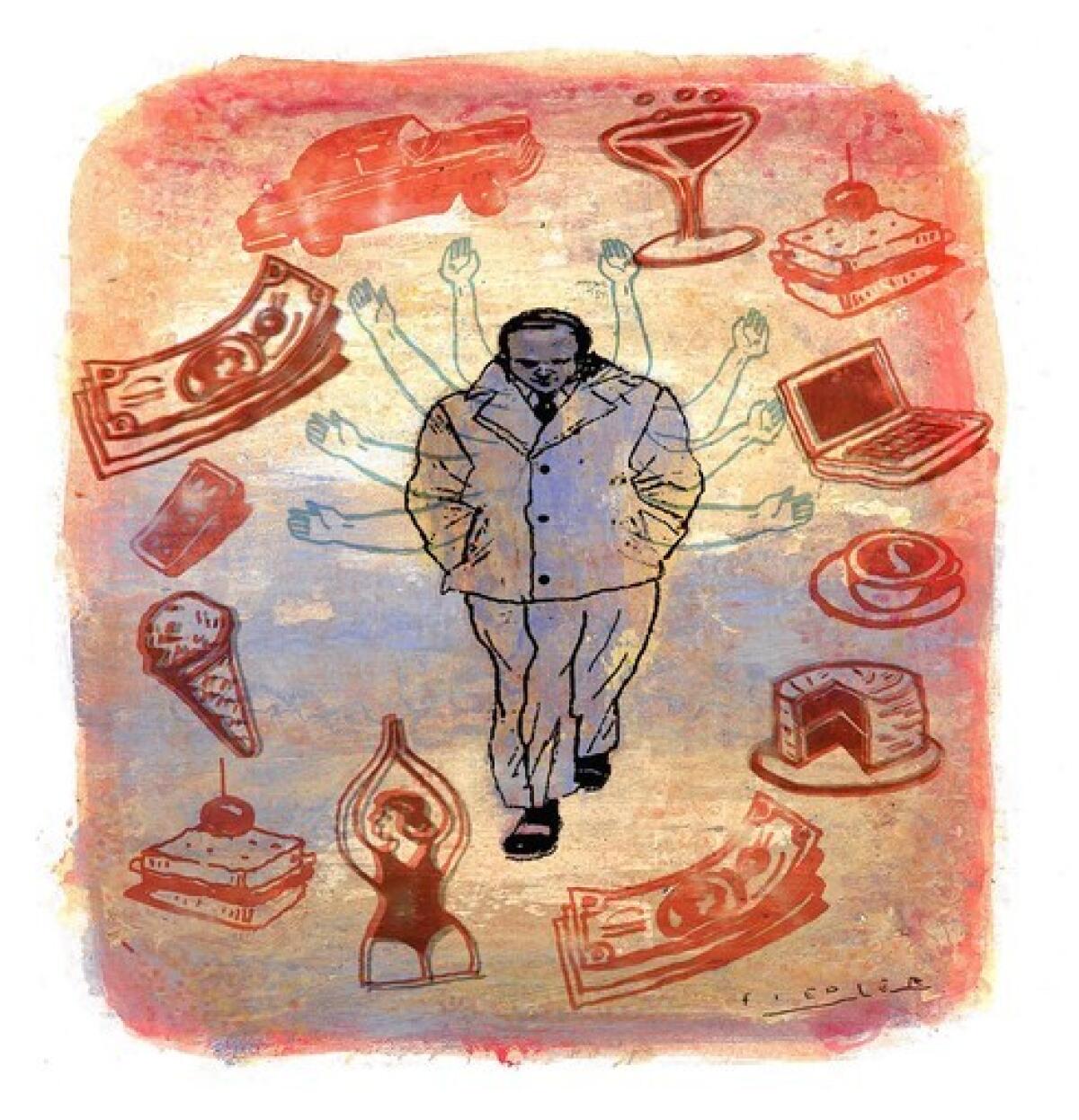Book review: ‘We Have Met the Enemy: Self-Control in an Age of Excess’ by Daniel Akst

- Share via
We Have Met the Enemy
Self-Control in an Age of Excess
Daniel Akst
Penguin Press: 304 pp., $26.95
Daniel Akst borrowed his new book’s title from “Pogo” creator Walt Kelly, whose “We have met the enemy and he is us” became a slogan marking the first Earth Day in 1970. However, in “We Have Met the Enemy: Self-Control in an Age of Excess,” Akst isn’t interested in saving the planet, at least as a first line of business. He’s intrigued by impulse control in America, what is eroding it and what that means.
The book opens much like a tract on obesity from the Morbidity and Mortality Report if it had been written by a social commentator and not clinicians from the Centers for Disease Control and Prevention. An anecdote about a corpse too fat to fit in a morgue freezer is followed in short order by the unsparing observation that an obese bariatric nurse at a Texas conference helped herself to a second plate of waffles smeared with cream cheese.
Akst, a former Times editor and writer who proclaims himself to be slender and pretty much addiction-free, is not sold on the nurse’s argument that obesity is genetic or the fault of the food offerings around us. Obesity, in the nurse’s eyes, is certainly not about self-control. And therein lies the problem. Akst here aims “to reinflate the narrowed arena of the elective, reclaiming most excessive behaviors from the realm of disease.”
By his own measure, that is a large task. Akst estimates that overeating, smoking, unprotected sex, drinking too much alcohol and similar excesses contribute to close to half of the deaths every year in the U.S.
Borrowing from sources as various as Homer and Columbia University psychologist Walter Mischel, Akst argues that willpower might be nothing more complicated than having the right strategy. His admiration for the attitudes of Aristotle and Homer is strong. Odysseus, for example, had himself strapped to a mast to resist siren song. The technique holds today, he says, with “pre-commitment”: the modern term for enlisting others to save us from temptation. Anyone who has handed car keys to a teetotaler before a night out knows that this can work.
Akst then hits modern brain chemistry and genetics. As the results of an experiment with 4-year-olds suggest, we’re not all born Odysseus. Even borderline libertarian Akst leaves the door open that social and genetic factors might be behind our frailties when it comes to Mischel’s “marshmallow studies.”
Conducted in the late 1960s and early 1970s when Mischel was at Stanford, children in these experiments were told that they could eventually have two sweets if they could delay eating one. Those with the greatest ability to delay gratification (a minority) went on to do better on college tests. The ones with the least willpower proved to be more susceptible to temptation. “[T]he kids who just couldn’t wait ... were found later in life to have lower educational attainment and more use of cocaine or crack.”
That this undercuts an argument that self-control is elective is strangely finessed when Akst moves on to crime. He cites research on poor impulse control in criminals, bundling it with speculation that it may be heritable.
This packaging amounts to an expedient eclipse of his own theme. Figures from the book’s opening all but disappear from consideration, as if unsuitable for discussion of free will. And so the largest hole in this book is the size of our slums and waddling suburbias, where it’s easier to buy a pint of scotch than fresh fruit or where candy is always child-level at the checkout.
The influence of religion is also scantly traced. In a joke best understood by himself, Akst titles a chapter on Freud “Let my people go,” bringing to mind Moses and black spirituals. As for the father of modern psychiatry and the disinhibited era that followed him, let it be noted — as Akst does repeatedly — that Freud smoked.
The availability of deadly substances such as tobacco isn’t Akst’s point: What really troubles him about the disease model of addiction is that “an addict’s behavior can be affected by incentives, while the symptoms of cystic fibrosis cannot.” Good point, well made.
Among the mounting environmental pressures preying on us, Akst does point to technology, asking: Why write a term paper when one can be bought on the Internet? In a weird moment, he writes, “The same is true of sex, available now almost literally on demand, at least for gay men trolling Craigslist…”
The suggestion that only gay men hook up through Craigslist is barmy. This indulgence investigator set out to study excess in libraries and laboratories, anywhere but supermarkets, streets, betting parlors and bars. He brags that he married his dentist.
Akst closes by writing, “That self-control is the biggest problem faced by many of the world’s people is a blessing in not much of a disguise.” Do not look to this book for an America that can’t be summed up by a good quote from de Tocqueville. Do read it if you agree that the 19th century Frenchman served us up on a half shell, and all you need is either Tabasco or lemon from Akst.
Green writes the Dry Garden column for The Times.
More to Read
Sign up for our Book Club newsletter
Get the latest news, events and more from the Los Angeles Times Book Club, and help us get L.A. reading and talking.
You may occasionally receive promotional content from the Los Angeles Times.










